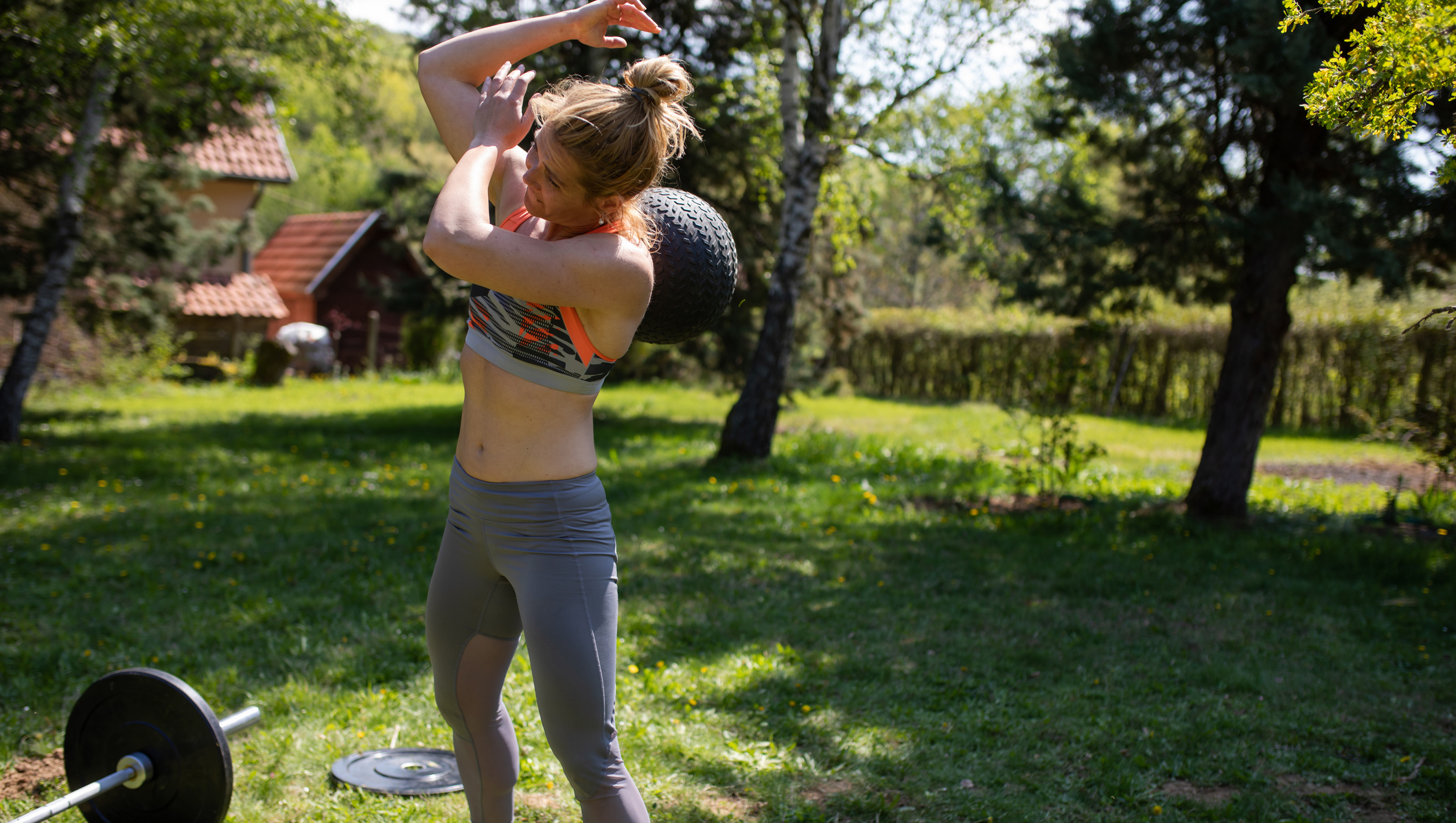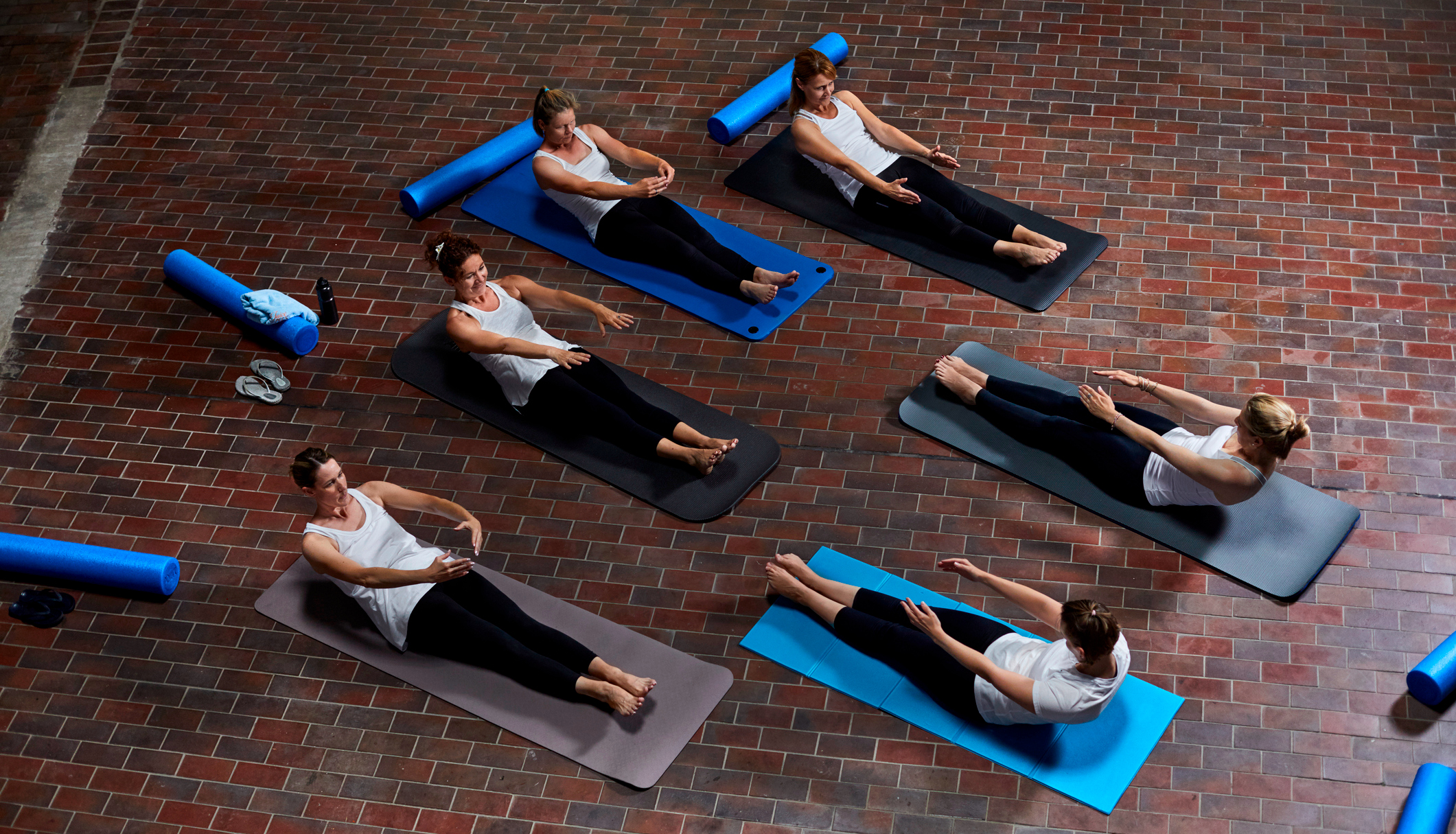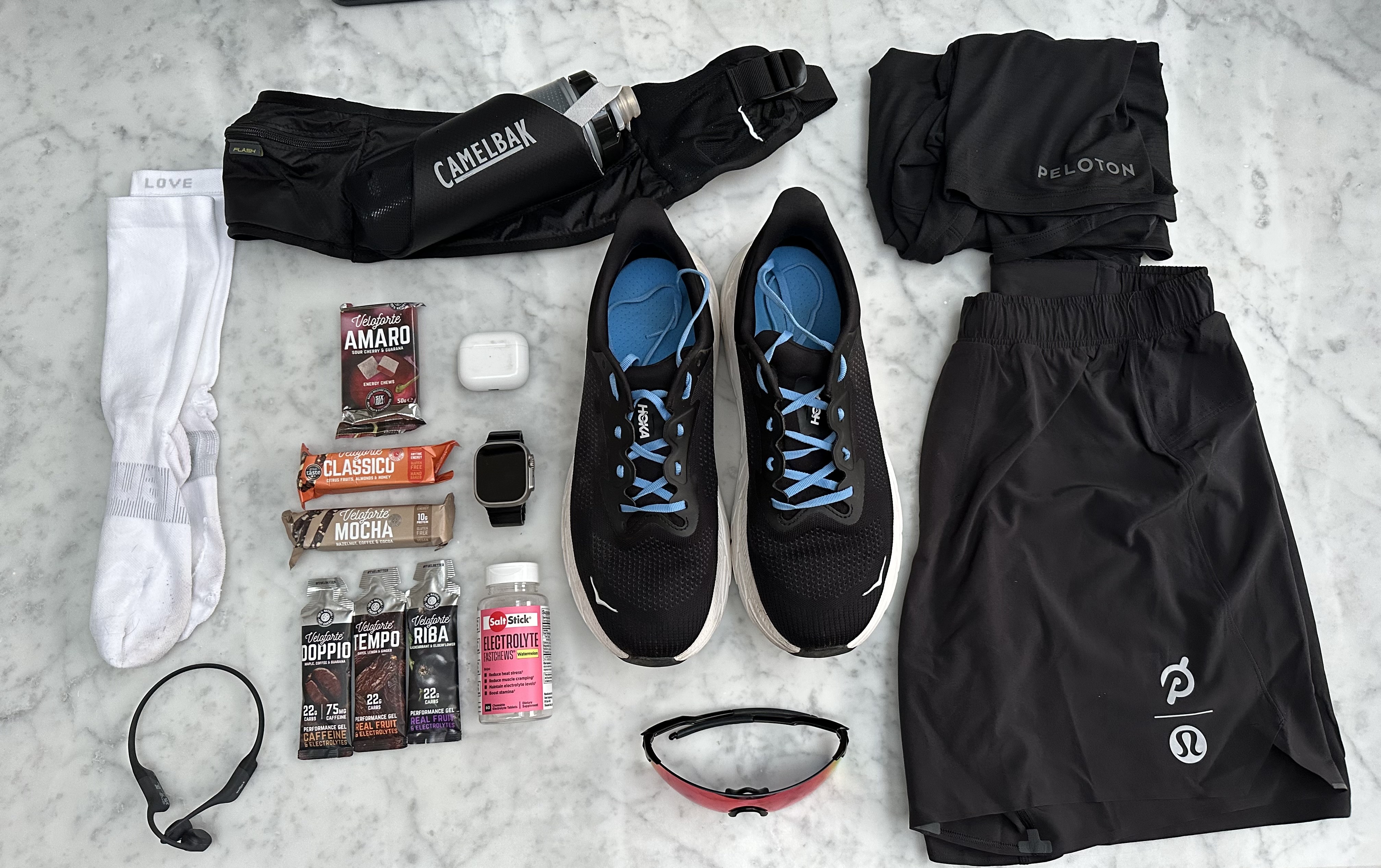How To Do A Burpee And The Benefits of Burpees For Fat Loss
Reap the fat-burning benefits of burpees with our form guide, tips, variations and workouts
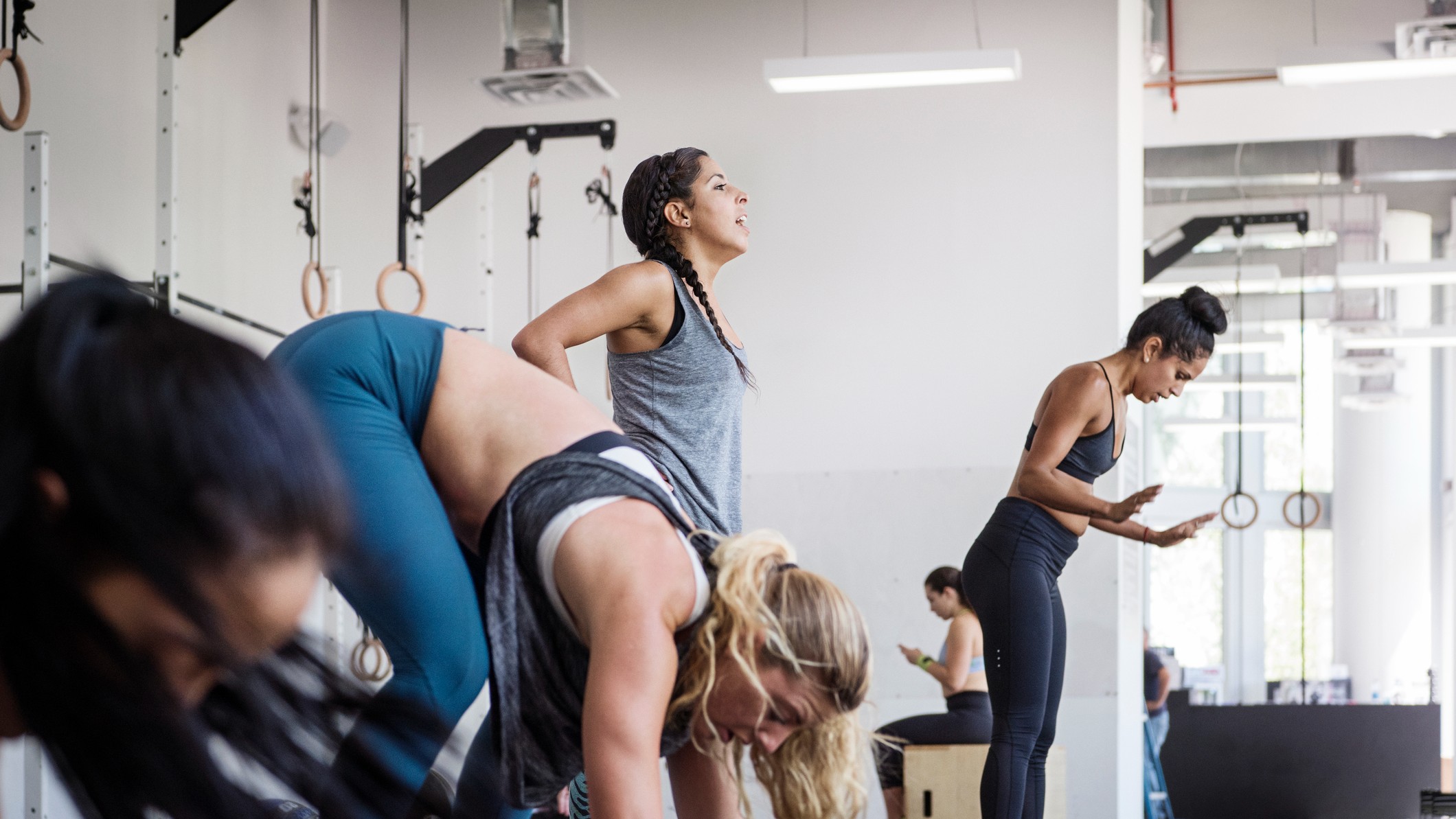
The first time you do a burpee you might wonder what all the fuss is about. Although it’s renowned for being a brutal bodyweight exercise that burns fat as fast as it boosts fitness, and is often used as punishment if you skip a section during obstacle course races, none of that tallies with how you feel after performing just one burpee.
But keep going and 30 seconds later you’ll be wondering how it’s possible for so many muscles to be aching and your lungs to be burning at the same time.
There is no fun way to do burpees. Whether you take them slow and hit a certain rep count, or try to cram in as many as possible within a set time period, they knacker you out faster than just about any other exercise out there. That’s the bad news.
The good news is that all that effort is absolutely worth it. The burpee works your arms, back, chest, core, glutes and legs—you name it, it works it. And burpees also spike your heart rate as much as sprinting for a bus does—one reason it’s a firm favourite among the high-intensity interval training (HIIT) crowd. And all of those benefits come without the use of any equipment, so you can do the burpee anytime and anywhere.
Read on to discover the best ways to include this effective exercise in your training.
Benefits Of Burpees
It’s important to extol the virtues of burpees before telling you how to do them, because once you’ve knocked out a set you’ll need some convincing to put yourself through that again. So here goes.
The burpee is a true full-body exercise, working most major muscle groups while also improving your cardiovascular fitness, and testing your balance and co-ordination. If you could only do one exercise for the rest of your life, the burpee would be a smart pick for keeping you in the best shape possible.
Get the Coach Newsletter
Sign up for workout ideas, training advice, reviews of the latest gear and more.
Not only do burpees work a range of muscles, they do so in a functional manner, so you’ll notice the improvements to your strength and mobility in your day-to-day life, not just in the gym. That’s if you even go to a gym—because you don’t need to for burpees, which require zero kit to do. All that’s needed is the steely determination required to get you through them… and perhaps an understanding neighbour who won’t complain about the frequent jumping up and down.
If you’re not convinced by our explanation of the merits of burpees, perhaps a word from the man who did more than 67,000 of them in a year might help. Craig Peters achieved the feat in 2016, when he started with one burpee on 1st January, then added one for each day of the year, finishing with 366 burpees on 31st December (madness to do it in a leap year), for a grand and terrifying total of 67,527 burpees.
“I do feel fitter—I’m much leaner, I’m in the best shape I’ve been in for a long time,” Peters told us after he completed his year of burpees. “I used to have a lot of back problems but I have had no problems in the past 12 months. It’s made my body stronger and more flexible. It’s little things like running for a bus or going upstairs—you certainly feel a difference. It’s a hell of a lot easier.”
The burpee is also an exercise that’s easy to vary and combine with other exercises so you work the body in different ways. You’ll find an extensive range of variations below, but first let’s run through how to do the standard burpee.
How To Do A Burpee
The classic burpee is a four-point move. From a standing position, drop into a squat with your hands on the ground just in front of your feet. Then kick your feet back behind you, keeping your arms extended so you are in a raised plank position. At this stage, the more adventurous can throw a press-up into the mix, which really ramps up the difficulty.
In the basic burpee, you remain in the raised plank and jump your feet back towards your hands. Then round off the manoeuvre by leaping into the air with your arms straight above you. Then do it all again.
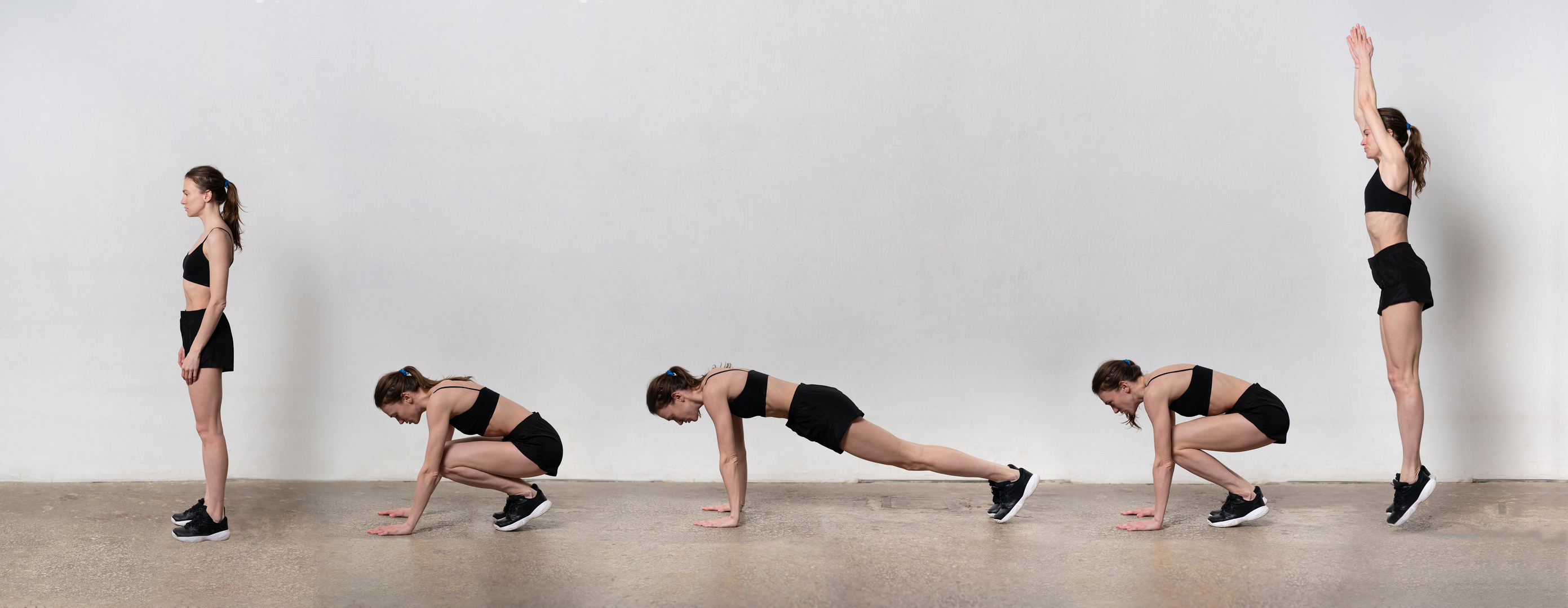
Burpee Form Tips
“There is a lot going on when you do a burpee,” says trainer Dan Baldwin of Six3Nine. “This means there's the potential to make the burpee harder and reduce the amount you can do, which means you're wasting energy and reducing the exercise's effectiveness.” Follow this five-point form guide to perfect the burpee and reap the worthwhile rewards, then use these tips when taking on the ruthlessly efficient burpee workout we've devised below.
- Mobilise: “The burpee can put a lot of stress through your ankles, knees and wrists,” says Baldwin. “Make sure you're thoroughly warmed up and you've done some mobility work, including press-ups, lunges and squats, to loosen up the joints.”
- Break it up: “The burpee can be complex so to start with, split the move into two parts: a squat thrust and a deep squat jump. Make sure you are comfortable with each phase of the exercise before combining the two.”
- Squat thrust: “For the squat thrust make sure your shoulders are directly over your hands, and your legs are extended into a press-up position. When jumping your feet in and out, keep your shoulders above your hands – don't let them move backwards or forwards.”
- Deep squat jump: “For the deep squat make sure your hips are sitting back and try to keep your chest as upright as possible. Explode up and ensure you cushion your landing by bending the knees as you make contact with the floor.”
- Get some air time: “Once you're happy you can perform both with good form, add the two together. Your arms can play a part here and as you transition from the squat thrust to the squat jump, swing your arms forwards and above your head for maximum height.”
Common Mistakes To Avoid
Skipping Steps
As you begin to tire, it’s a common impulse to want to skip certain steps in order to make the burpee easier. Don’t beat yourself up about it, we’ve all been there but remember what your school teachers told you—you’re only cheating yourself. Applying the correct level of intensity to the burpee at all times ensures you reap all the heart-healthy, muscle-boosting benefits. If you begin to falter, rest briefly then go again.
Neglecting Your Core
The plank stage of the burpee is pivotal to ensuring your abdominals get sufficient stimulation. Ensure your shoulders are parallel to your wrists, keep your core contracted and engaged and your back straight, neutrally aligned with your glutes. Many make the mistake of arching their back, negating the positive effects the burpee has on the abs, while also risking injury.
Doing Too Many Reps
As is the case with virtually every other exercise, doing more reps for the sake of it does not directly correspond to a successful workout. Focus on nailing the correct technique as explained above first, and this will help you to progress more smoothly.
How To Improve At Burpees
Burpees are commonplace in CrossFit workouts, with speed and efficiency paramount to recording a good time or score. So if you want to get better at burpees, who better to ask than CrossFit Games athlete Emma Tall?
“There are a lot of burpee variations in CrossFit, but in general I would say rhythm and breathing are key,” says Tall, who spoke to us at a Reign Total Body Fuel event.
Tall recommends maintaining a fast but consistent pace that you can stick to, and trying to keep your breathing controlled throughout. Don’t make the mistake of going all-out from the off and holding your breath through a few reps, because this is sure to leave you gasping for air.
Tall also advises to keep your movements to the absolute minimum, especially once you progress to variations such as burpee box jump overs or bar-facing burpees.
“This applies to most movements, but try not to take extra steps, walk around or waste time and energy on something that doesn’t give you another rep,” says Tall.
Six Burpee Workouts
Burpees can be incorporated into circuit training, used to warm up before other exercises or done over and over again to act as your entire workout.
100 Burpee Challenge
The 100 burpee challenge isn’t a warm-up, it’s a workout and a half: just do 100 as quickly as you can. The first 15 shouldn’t take much more than a minute, but the rest will take a lot longer. Any time under 10 minutes for the full 100 is pretty darn impressive. If you’re nowhere close, try this format to pace yourself, which adds up to about 16 minutes of rest: Do one, rest for 10 seconds, then do two and rest for 20, all the way to 10, then back down. That’s 100.
The Burpee Ladder
The burpee ladder is another way to build a workout around this king of all exercises. Start with 10 burpees, have a quick rest, then do nine, eight and so on. If you’re feeling brave, do burpees, press-ups and sit-ups on every rung. It’s a weird feeling to view sit-ups as a welcome break.
Max Out
This dynamic workout will build up your tolerance to the lactic acid inevitably flooding your legs and help increase your anaerobic performance for a fitness boost with a large scoop of fat-burning benefits.
First, find out your maximum set by doing as many burpees as you can before having to stop. Reduce that number slightly, and perform three sets with a 30-second rest between. For example, if your maximum set is 20, rest for 30 seconds then do 15 for your working set, rest another 30 seconds, then repeat a further two times. Now breathe, hard.
CrossFit Open Workout 12.1
The CrossFit Open is an annual fitness competition which kicks off the CrossFit season and it’s designed so everyone can take part, no matter their level of fitness. The first workout of the 2012 CrossFit Open tasked people with completing as many chest-to-floor burpees as possible in seven minutes.
If you want a target to aim for, Kristan Clever posted the best women’s score with 143, while Scott Panchik topped the men’s rankings with 163.
Death By Burpees
The “Death By” format makes for an excellent workout finisher and requires you to complete an ever-growing number of reps in a set period of time.
Here, complete one burpee in the first 30 seconds, then two reps in the next 30 seconds, then three reps, and so on until you can’t complete the reps in the time allowed.
30-Day Burpee Challenge
A one off not enough? Then try our 30-day burpee challenge. The beauty of this training plan is that it’s scaleable—it’s based on your current fitness level, established by the test on day one.
Best Burpee Variations
Chest-to-floor burpee
This tougher variation is about as common as the standard burpee, so don’t be surprised if it’s what’s expected of you in an exercise class that involves burpees. It’s the same as the standard move except that when you reach the raised plank position, you perform a press-up, lowering your chest to the floor, before you jump back up.
Burpee tuck jump
It’s annoyingly easy to combine other exercises with a burpee to make a Frankenstein’s monster of a move, as this nasty variation shows. Perform a burpee as normal, but when you leap into the air afterwards, raise your knees to your chest. This will increase the cardio benefits of the exercise and also ensure you aren’t half-arsing your jumps, which is common when pushing through a set of burpees.
Dumbbell burpee
A surefire way to make any exercise trickier is to add some weight and you can do that with the burpee by holding a dumbbell in each hand. It’s better to opt for hexagonal rather than circular dumbbells for this, because you’ll be supporting your bodyweight on them so you’ll want a stable base. Perform your burpee as normal, holding the weights at all times—and add a renegade row if you want to make the move even tougher.
Single-leg burpee
If you’re looking for a straightforward way to increase the difficulty of burpees without introducing equipment or extra movements, try doing it on one leg. This will ramp up the core control required to avoid toppling over to one side, as well as beefing up the benefits to the leg muscles that are working to compensate for the lack of support from the other leg. You can alternate which leg is grounded or complete all your reps on one side before swapping. Try this with the chest-to-floor burpee for a truly tough variation.
Burpee pull-up
Makes you sick to see those words put together, doesn’t it? But hear us out. Burpees and pull-ups both have a decent claim to being the single best bodyweight exercise you can do, so meshing them together into one super-move creates something truly special. Perform your burpee as normal (press-up optional), then as you jump up, grab the pull-up bar with an overhand grip and haul yourself up until your chin is level with the bar. Lower under control until your arms are fully extended, then let go and continue into the next rep. The pull-up is a brilliant back, shoulder and arm exercise that complements the cardio and strength benefits of the burpee perfectly. This variation is brutal, but well worth the pain.

Nick Harris-Fry is a journalist who has been covering health and fitness since 2015. Nick is an avid runner, covering 70-110km a week, which gives him ample opportunity to test a wide range of running shoes and running gear. He is also the chief tester for fitness trackers and running watches, treadmills and exercise bikes, and workout headphones.



